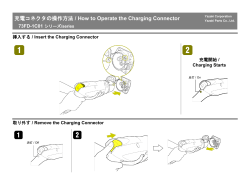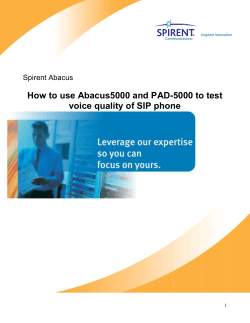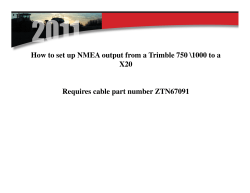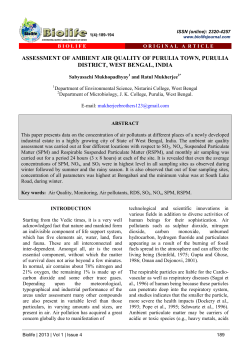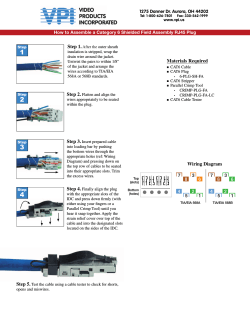
How to configure and prepare Nox T3 for Differential Pressure Recording?
How to configure and prepare Nox T3 for Differential Pressure Recording? Customer Support Document Version 2.0 Latest Revision 10 February 2014 Copyright© 2014 Nox Medical - All rights reserved TM TM NOX-T3 and Noxturnal are manufactured by: Nox Medical ehf Hofdatorg, 12th Floor Katrinartuni 2 IS - 105 Reykjavik Website: www.noxmedical.com Copyright Notice No part of this publication may be reproduced, transmitted, transcribed, stored in a retrieval system, or translated into any language or computer language, in any form, or by any means: electronic, mechanical, magnetic, optical, chemical, manual, or otherwise, without the prior written authorization from Nox Medical. Disclaimer This document may contain typographical errors or technical inaccuracies. Nox Medical does not accept any liability for the use or misuse whether direct or indirect of the products, or for damages arising out of the use of or inability to use the products. Users must accept all responsibility for any results obtained by or concluded from data obtained by the products including software from Nox Medical. All clinical conclusions and decisions that are based on the use of this product are the responsibility of the user. This knowledge base article describes how to configure and setup the Nox T3 device to record differential pressure supported by the Ultima Pressure Sensor. 1. Configure the Nox T3 device To configure a T3 device for a new recording, start the Noxturnal application and connect the device to the computer using a USB cable. Noxturnal automatically detects the device and shows information about it on the Start Page. Click on the Start a New Recording button on the Start Page and a wizard opens up which guides the user through the configuration of the T3 device. 1. From the wizard select the channels as has been selected in Figure 1. a. Check Snore Sound to record patient respiratory sounds b. Check the Cannula option and Mask Pressure Figure 1 Step 1 in configuring the device for Peumo Flow recording c. Create Pneumo Flow channel type: i. Select Edit (located in red box in figure 1) ii. The wizard Manage EXG Channels appears: - Select Add New Figure 2 Manage EXG Channels How to configure and prepare Nox T3 for Differential Pressure Copyright © 2014 Nox Medical 2 of 9 iii. The wizard EXG Channel appears, edit in: - Label: PneumoFlow - Signal Type: In the dropdown list select > Resp.FlowTemp-Thermocouple.NasalOral Figure 3 EXG Channel - Press OK in EXG Channel Wizard d. Check Channel 1 and from the drop-down list select Pneumo Flow e. Enter oximeter information if applicable 2. Click the Next button to move to the next Step and schedule time of the T3 device (Manually Start Recording or Start Recording At). 3. Finish the next steps by selecting the battery types and editing the Patient Information. How to configure and prepare Nox T3 for Differential Pressure Copyright © 2014 Nox Medical 3 of 9 2. Setup for the Differential Pressure Sensor and the Nox T3 To setup the Nox T3 and the differential pressure sensor for recording, please follow the steps below: 1. Connect the two Hydrophobic Filters to the Ultima Pressure Sensor. Figure 4 Pneumo Flow Sensor connected to the Ultima Pressure Sensor 2. Connect the white Diff Pressure Connector Cable to the Airflow & Snoring input on the Ultima Pressure Sensor device. Figure 5 Diff Pressure Connector Cable connected to the Ultima Pressure Sensor How to configure and prepare Nox T3 for Differential Pressure Copyright © 2014 Nox Medical 4 of 9 3. Connect the Mask Tube to the Pneumo Flow Sensor. Figure 6 Mask Tube connected to the Pneumo Flow Sensor 4. Wrap the Diff Pressure Connector Cable around the Mask Tube Figure 7 Diff Pressure Connector Cable wrapped around the Mask Tube 5. Connect the Pneumo Flow Straight Connector (Pneumo Flow Sensor) to the CPAP/VPAP Figure 8 Pneumo Flow Sensor connected to the CPAP/VPAP How to configure and prepare Nox T3 for Differential Pressure Copyright © 2014 Nox Medical 5 of 9 6. Connect the Diff Pressure Connector Cable to the T3 Adapter Cable as shown in figure 7. Figure 9 Diff Pressure Connector cable and T3 Adapter Cable connected 7. Plug the two unipolar connectors in Channel 1 inputs on the Nox T3 device. Figure 10 Two bipolar connectors plugged to Channel 1 8. Plug the filter tube in the pressure port of the T3 recording device. Figure 11 Filter Tube connected to the Pressure Port 9. Connect the mask tubing (female x male) to the mask. How to configure and prepare Nox T3 for Differential Pressure Copyright © 2014 Nox Medical 6 of 9 Figure 12 Mask tubing connected to the mask 10. Fasten the Diff Pressure Connector Cable to the mask tube with medical tape; it makes it easier for the patient to unplug/plug the device during the recording. Figure 13 Fasten the Diff Pressure Connector Cable to the mask tube with medical tape 11. On the left side of the Ultima Pressure Sensor switch the button to select the gain, Low or High. How to configure and prepare Nox T3 for Differential Pressure Copyright © 2014 Nox Medical 7 of 9 Figure 14 Select the Gain 12. On the right side of the device switch the button to power the device on. Figure 15 Turn the device on 13. Now the Status light located on the top of the device blinks green. Figure 16 The status light blinks green 14. Press the T3´s middle button to start recording. 15. Now the patient is ready to go to bed. How to configure and prepare Nox T3 for Differential Pressure Copyright © 2014 Nox Medical 8 of 9 Figure 17 The Setup is done How to configure and prepare Nox T3 for Differential Pressure Copyright © 2014 Nox Medical 9 of 9
© Copyright 2025







